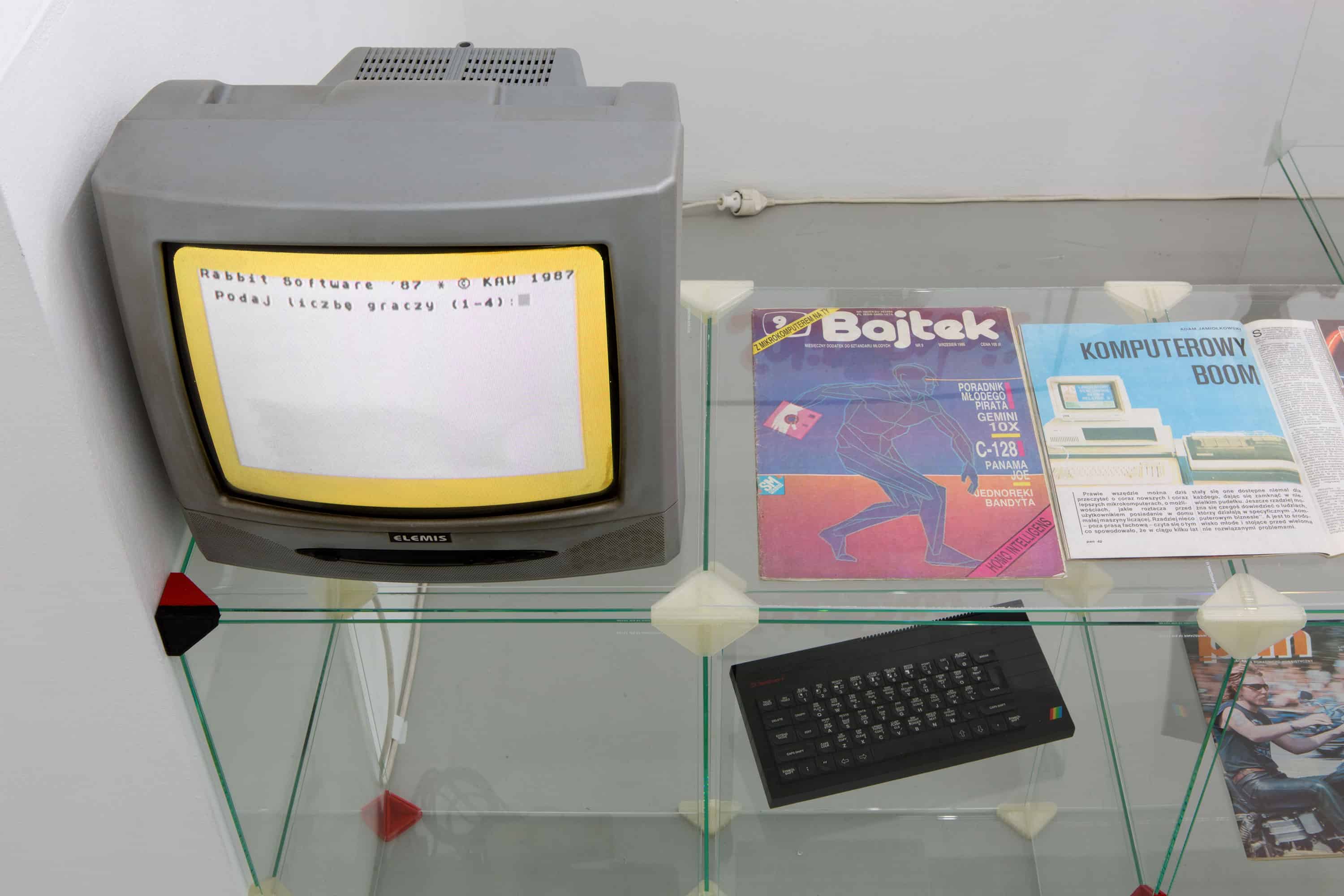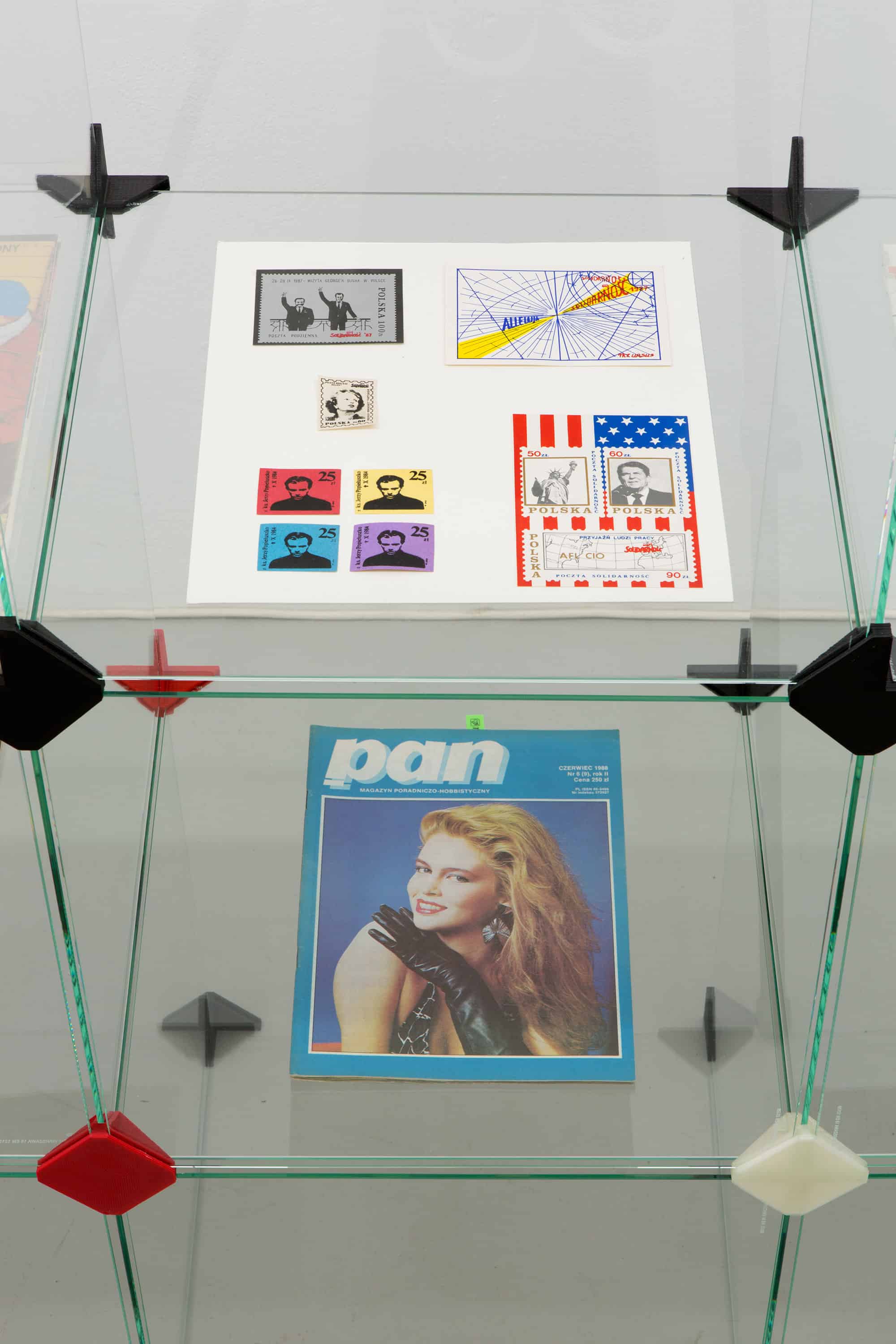In the ’80s, Poland was torn between two contradictory realities – communism and capitalism – trying to “decolonise” itself while being “colonised” at the same time, reacting to new needs, desires, products and visual culture. For the “1985” exhibition held in Cologne, and shown as part of a wider “Perverse Decolonization” project, Janek Simon chooses magazines and other items, as a reflection of an ambiguous Polish identity during this time of transformation.

Janek Simon, Perverse Decolonization. 1985, exhibition
One of the magazines in the exhibition is “Pan”. It focussed on all aspects of contemporary life, which resulted in a seemingly absurd mix of politics, soft pornography, fashion, technology and other miscellaneous topics – eventually neatly categorised as a magazine with tips and about hobbies. The exhibition includes copies of the magazine locked in glass showcases. Usually, I am not a fan of the extensive use of such a form of display – after all, it stops you from the natural urge to pick up the magazines and archival material and flick through them. But visiting this exhibition made me redefine my prejudice towards this form of display. The magazines are carefully arranged, composed like a consistent collage. They are visually engaging and alluring, with catchy and often preposterous headlines, just to name a few: “Tits and castles”, “How to cheat on your wife”, “We are fighting pornography” (obviously next to an oversexualised photo of a woman), or confusing phrases on the covers, seemingly pulled out of a surrealist hat full of random words and phrases:
“Cosmic space is calling/Kaczyński, Napoleon and… the Army/The Deer Hunter”,
“Mysteries of Hypnosis/Piłsudski/Eros in the literature”,
“Triumphant Venus/My son – Drug Addict/President Show/Sex and Video”.

Janek Simon, Perverse Decolonization. 1985, exhibition
It marries reportage on Wojciech Jaruzelski’s political activity, with female nudes, and the comparisons of the latest radio designs. These, however, are not just funny curiosities. By including the year 1985 in the title of his exhibition, Janek Simon undermines the symbolic value of the year 1989. He highlights that changes to the system were visible earlier. In addition to the common knowledge about the events of 1989, the exhibition shows that the revolution from communism to capitalism was preceded by smaller, evolutionary changes. What complicates this crazy, schizophrenic situation is that the Communist Party played a role in this evolution, in my view, possibly because it was predicting its inevitable failure and tried to “leave the sinking ship”. As the curator, Aneta Rostkowska, explains:
This exhibition is an outcome of Janek Simon’s research on Polish political transformation. It is said that everything started in the ’90s, then the system has changed. 1989, 1990 – it’s obvious. But in fact, this transformation started earlier – in the 80’s many ideas from the West, connected to the consumerism as a lifestyle, appeared in Poland. Magazines, such as “Pan” were one of the distribution channels for such ideas. The magazine was published from 1987 to 1991 by an organisation controlled by the Communist Party. “Pan” was based on various western magazines. It was a mix presenting different ways of thinking, concentrated on the consumption but also the objectification of women. It was extremely popular and thus became a tool for a wider, mental transformation. It introduced the mechanisms of popular culture and delivered ideas at a subconscious level. Certainly, it was not a magazine established for the promotion of communist values.

Janek Simon, Perverse Decolonization. 1985, exhibition
The exhibition also includes a magazine entitled “Bajtek” (from computer “bytes”) – an expression of fascination with computers and other new technologies. Technological changes, as a biometer of wider social and cultural mindset shifts, are important for Janek Simon’s practice. Signs of a different way of thinking, were also visible at an educational level, in the form of video games and board games presented in the exhibition, such as “Eurobiznes” – a Polish imitation of “Monopoly”. As explained by the curator:
This game is also a way of introducing capitalist system rules. A prototype for the original Monopoly, that was invented by an American woman, Elizabeth Magie Phillips, aimed at showing how damaging monopolies and market dominance are – it was very anticapitalistic in its meaning. As a result of unethical actions, the idea behind it was utterly diverted.

Janek Simon, Perverse Decolonization. 1985, exhibition
Visitors to the exhibition can also watch a few scenes from the “worst Polish movie of all the time” (IMDb score – 2.3/10), a musical called “Love From the Hit Parade”. Part of the plot revolves around the topic of peoples’ desire for foreign goods, such as computers and efforts of customs officers to prevent smuggling them to Poland (everything is happening while dancing and singing of course). The movie is from 1985. The curator Aneta Rostkowska adds:
Media were preparing their viewers for later transformations, identifying them with a positive shift, creating ideologically fertile ground for relishing capitalism. In the Solidarity poster itself, we find a character from the American western movie. This exhibition also deals with popular culture and, in my interpretation, the ways ideologies manifest themselves in popular culture. They affect our subconsciousness and imagination. In the same way, we may analyse our contemporary pop culture.

Janek Simon, Perverse Decolonization. 1985, exhibition
Other elements of the exhibition create a microcosm of the late 80’ and early 90’ design and immerse the viewer in this historical, but not so distant, reality. Everyday objects, lifted from the pages of the magazines, like hairdryers, keyboards, tv sets, much-revered collections of western beer cans, and Polish crystal vases sold worldwide provide an important context. All of those artefacts, ready-made objects in vibrant colours, fit well in the white gallery space. They lure the viewer with their intriguing forms. In some cases, such objects of nostalgia have made their way back into contemporary fashion or design. The showcases created by the artist are artworks themselves. As intended by the artist, their appearance brings to mind Pewex shops. This carefully designed time machine also makes us pose questions about Polish identity, the character of Polish transformation and its cultural and visual aspects. But how does it deal with “perverse decolonisation”? I’ve asked Aneta Rostkowska about the title and its relation to this broader and more complex project:
In some cases, the emancipation of a country ends with strongly manifested national identities, sometimes even fascism or nationalism. One of the goals of “Perverse Decolonization” is to analyse the way in which postcolonial theory started to be used for justifying such practices. It can be even observed in Poland, where some politicians from the ruling party use the emancipatory rhetoric. Obviously, there is nothing wrong with gaining autonomy, but unfortunately, it’s becoming tightly bound to the idea of “pure Polish identity”, which obviously doesn’t exist. Identity is always produced in connection with other cultures; it’s a hybrid. It seems that the postcolonial theory was taken over by certain groups and used perversely. These groups are fixated on the issues of specific identity and culture while omitting aspects that could bring nations together along more universalist ways of thinking or provide a completely new perspective. Janek Simon’s exhibition shows that similar processes took place in the ’80s and ’90s in Poland. The country was decolonised from the communist discourse, but it didn’t result in novel forms of economic systems or organising social life. Instead, it ended up with scurrilous capitalism. In this sense, the process of decolonisation in Poland could also be perceived as perverse.

Janek Simon, Perverse Decolonization. 1985, exhibition
“Perverse Decolonization” project started in Cologne last year and is led curatorially by Ekaterina Degot and David Riff, joined later by Aneta Rostkowska as a curator of artistic commissions. It is a collaboration between several institutions and researchers which culminated in the final symposium on 16-17 November 2018. Aneta also curated another exhibition as a part of this programme which tackles the problem of colonisation and decolonisation with a different approach, concentrating on the situation of female workers and class divisions: “Perverse Decolonization. Today is the shortest day of the year but somehow hanging around with you all day makes it seem like the longest” showed works by Saddie Choua and was on view until 2 December 2018.
Written by Natalia Dorocka
Edited by Contemporary Lynx
Exhibition: Janek Simon – “1985”
3.11.2018–2.12.2018
kjubh Kunstverein e. V., Dasselstraße 75, 50674 Cologne
Curator: Aneta Rostkowska












